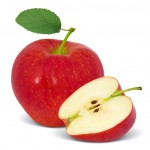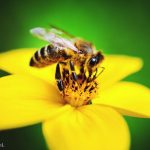The Environmental Working Group (EWG) publishes an annual shopper's guide ranking produce by pesticide residue level. The guide uses data from 32,000 samples tested by U.S. Department of Agriculture (USDA) and the U.S. Food and Drug Administration (FDA) to rank four dozen fruits and vegetables .The ones with the most residue are called The Dirty Dozen and the least The Clean Fifteen. This year's report found that 65 percent of the samples analyzed tested positive for pesticide residues. For the fourth straight year, apples were found to have the most residue, while some tropical fruits had very little. For example, 89 percent of pineapples, 88 percent of mangoes, 82 percent of kiwi and 80 percent of papayas had no residues. The "cleanest" fruit was avocados. Just 1 percent of samples … [Read more...]
Extreme Levels of Roundup Found in GE Soy
A new study conducted at Arctic University of Norway and published in the June issue of Food Chemistry has found that there are "extreme levels" of Roundup, an herbicide, in genetically engineered soy. The soybeans were harvested in Iowa. High levels of Roundup were found on 70% of the GE soy plants. The Roundup Ready GM soy comprises 93 to 94% of U.S. soybean production. The plant is genetically modified to tolerate exposure to glyphosate-based Roundup during its entire growth cycle. Food Poisoning Bulletin has told you about issues with these plants before. Roundup interrupts the shikimate pathway in plants and kills them. Scientists used to think that made the chemical safe for humans, but it has been discovered that our gut bacteria, which are critical to our immune systems and … [Read more...]
EWG Looks at EU Banned Chemical Used on U.S. Apples
Environmental Working Group is asking the U.S. government to put a stop to a chemical used on non-organic apples grown in America because its makers in Europe could not show it didn't pose a rise to human health. That analysis found that the chemical, called diphenylamine, known as DPA, is used to coat apples during storage to prevent "storage scald", brown or black patches, since the fruit is only harvested once a year. A study conducted by the USDA in 2010 found that 80% of non-organic apples were coated with DPA. American apple growers say that DPA is a "benign growth regulator", but European officials have banned the use of DPA on apples and other fruit since 2012. Apples are one of the "dirty dozen" fruits and veggies EWG suggests consumers should avoid when grown conventionally … [Read more...]
MN Beekeepers Asking Ag Officials To Stop Treated Corn Seeds
A group of beekeepers in Minnesota is concerned about the effect of corn seeds treated with neonicotinoid pesticides on bees, according to MPR. They have been reported mortality events among bees at corn seeding time. The dust is coming off the seeds and poisoning honey bees. More than 1/3 of the country's honey bee population has died every year for the last several years. The group has also sued the EPA for not acting on the pesticides, which many think are causing massive bee die-offs in recent years. The Minnesota Department of Agriculture is currently reviewing neonicotinoids for their effects on bees. The National Honey Bee Advisory Board, which is working to try to find a solution to this problem, is conducting risk assessment around the country. But since pesticide … [Read more...]
Hawaii Community Defends Pesticide Disclosure Laws
Multinational chemical corporations are challenging a law in Hawaii that requires disclosure of pesticide use on genetically engineered crops. The Center for Food Safety and a coalition of Kaua'i residents, along with Earthjustice, are filing papers as defendants against this action. Ordinance 960 informs Kaua'i residents about the pesticides applied to GE crops. Many residents have suffered symptoms of pesticide exposure. Corporations grow genetically engineered and modified crops on Kaua'i as experiments. As a result, some of the "most toxic pesticides still in use" are sprayed in areas close to homes, waterways, and schools on that island. The law simply requires disclosure of the chemicals used on the island, and establishes buffer zones around locations such as schools and … [Read more...]
Warning Issued About Pesticides in Mexican Cactus
The California Department of Public Health (CDPH) is warning people not to eat cactus imported from Mexico because it contains unapproved pesticides. A routine surveillance sample isolated as much as 5.8 parts per million of Monocrotophos, an organophosphate based pesticide that has been banned from use in the U.S. since 1989. The product was sold at five markets in California, including La Superior SuperMercados in Sacramaento, Stockton, Woodland, and Pittsburg between 2/6/2014 and 2/12/2014; Mercado del Valle in Concord between 2/6/2014 and 2/12/2014; and La Sucursal Produce on Central Avenue in Los Angeles on 2/6/2014. It was also sold at Fresh American Produce on Mission Road in Los Angeles on 2/7/2014 and at J&L Produce on Central Avenue in Los Angeles on 2/6/2014. Whole cases … [Read more...]
USDA Seeks Public Comment on New GE Crops
The USDA's Animal and Plant Health Inspection Service (APHIS) released its Draft Environmental Impact Statement (DEIS) as part of a review to determine whether to deregulate generically engineered (GE) corn and soybean plants that are resistant to herbicides, including 2,4-D, which is half of the toxic chemical mixture Agent Orange. APHIS is performing an assessment of the plants, while the EPA is conducting a review of the related herbicides. To accomplish these tasks, APHIS conducts two analyses to see if the GE plants pose a "pant pest risk" to agricultural crops. Their preliminary assessment finds that they do not pose a plant pest risk. Then APHIS must evaluate the potential effect on the environment. The EPA conducts risk assessments on potential human health risks. Dow … [Read more...]
Center for Food Safety Fighting Sulfoxaflor, a Bee Killer
Without bees, many of the foods we regularly eat and enjoy would disappear off the face of the earth because they must be pollinated before they can produce fruit. Honey bees are dying at an alarming rate. Scientists are blaming a group of insecticides called neonicotinoids. Unfortunately, the EPA has decided to register sulfoxaflor, a new neonicotinoid. The Center for Food Safety has filed a legal brief on behalf of many consumer and environmental groups against this decision. The brief states, "scientists have linked the drastic declines in honey bee and other pollinator populations to systemic pesticides known as neonicotinoids. Sulfoxaflor is a systemic pesticide with the same mode of action as neonicotinoids, that EPA determined is 'very highly toxic' to bees." The CFS brief … [Read more...]
Council in Kaua’i Mandates Pesticide, GMO Reports
The Center for Food Safety (CFS) reports that the Kaua'i County Council overturned a mayoral veto of a bill that would require an assessment of risks stemming from pesticide use and the cultivation of genetically engineered crops. Mayor Bernard Carvalho vetoed the legislation last week. Sylvia Wu, an attorney with the Center for Food Safety said in a statement, "the people of Kaua'i have demanded that their elected representatives serve the people, not the corporations. Today the County Council proved that the people of Kaua'i cannot be bullied by big corporations with deep pockets." Bill 2491 requires that biotech and chemical companies report and publicly disclose the pesticides and the GE crops they use on the island. In addition, no pesticides can be used near schools, medical … [Read more...]
Scientists Learn More About Bee Deaths: Fungicides Are a Problem
A new study published in PLOS One shows that scientists are learning more about the mass bee die-off around the world. Scientists have been puzzled about Colony Collapse Disorder (CCD) that has destroyed 10 million beehives in the past six years. According to this new study, it seems that fungicides in combination, which were thought to be "fairly sale" for honey bees, are increasing their susceptibility to an insect gut pathogen called Nosema ceranae. In other words, chemicals and pathogens are interacting to kill the bees at sub-lethal doses. And while farmers are warned to avoid spraying pesticides when pollinating bees are present, such warnings are not on fungicide labels. In addition, the bees are collecting pollen from weeds and wildflowers near farm fields, which raises concerns … [Read more...]











